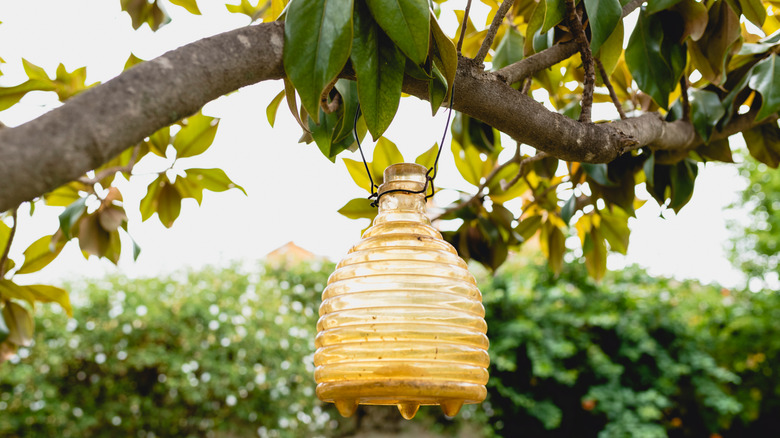Hornets can be very dangerous insects to encounter in your yard. These subspecies of wasps have the ability to sting several times and are pretty aggressive when it seems like their territory is being intruded on. Most hornets build nests in high, secluded, and sheltered spaces, like corners of patios or under shed roofs, but some do burrow into the ground. It is always best to keep your eyes open and spot nests as soon as possible, as they can grow to hold up to 1,000 hornets at a time. Taking immediate action to remove a nest when one is discovered will be the safest option. Even if you make an effort to steer clear of it, pets and kids won’t be so conscientious, and accidents are bound to happen.
Signs that you may have a nest nearby include a higher presence of hornets in your yard and ones that seem more aggressive than the typical hornet passing through. To track down where a nest may be, take a careful watch of where the hornets fly to and from and inspect those areas. Once a nest has been located, you should approach removing it with the utmost caution and hire a professional if you’re allergic. With some handy wasp spray and protective gear, you should be able to remove the nest within just a few days.
Removing a hornets’ nest
Once you’ve located a hornet’s nest on the property, prepare to remove it after sundown when most of the hornets are inside and not as active. Always take safety precautions by wearing protective gear, covering arms and legs in long sleeves and pants, and using gloves and goggles. Wasp spray tends to have at least a 20-foot spraying capability so that you can maintain a reasonable distance away from the nest; however, safety gear is still essential. Additionally, spraying the nest is best done when the weather is clear, and there is no wind or rain to dim the effects of the insecticide.
After thoroughly saturating the nest, refrain from immediately knocking it down. You’ll want to give the poison time to take its full effect and kill as many hornets as possible. Wait several hours and possibly even a full day before returning to the nest to assess its condition. If you notice any more activity or just want to be safe, apply the solution again. As soon as you are confident all the hornets are incapacitated, use a shaft to bring the nest down directly into a disposable bag or container if possible. It’s always safest to remove the nest from your property immediately. Furthermore, be honest about when it is time to hire a professional. Anyone with allergies should refrain from dealing with the nest themselves, and sometimes the nest may be in a hard-to-reach area that requires a more intimate approach.
Preventing hornets in your yard

Removing hornet nests is no small task, and for those who wish to avoid the problem in the future, there are ways to deter these eusocial wasps from making your home into their own. Hornets are drawn to sheltered and safe places, so eliminating those spaces will significantly decrease the likelihood of a nest being built. Seal cracks and gaps in outdoor areas like garages and porches along the house’s foundation and windows. Tree cavities make the perfect hornet shelters and should also be filled if possible. Simply keeping trees and shrubs on the property cleaned up will also remove sheltered spaces overall. Hornets are drawn to sugary and sweet smells, trash and compost being a significant culprit. Keep all disposable bins tightly secured, and be proactive about removing fruit and other foods from the yard after a picnic or snack.
Given that saccharine fragrances draw in hornets, avoid planting lovely-smelling flowers around the most active areas of your property. Instead, deter the wasps from doors and walkways with repelling plants like basil, mint, thyme, marigold, and eucalyptus. Lastly, you can place homemade or store-bought traps throughout the property. Water buckets with vinegar and bottles with sugary liquid work like a charm. Otherwise, local department stores have all kinds of different and effective lures. You can even consider placing fake nests outside as well. With hornets being a territorial species, they are likely to steer away from areas that already seem occupied.



